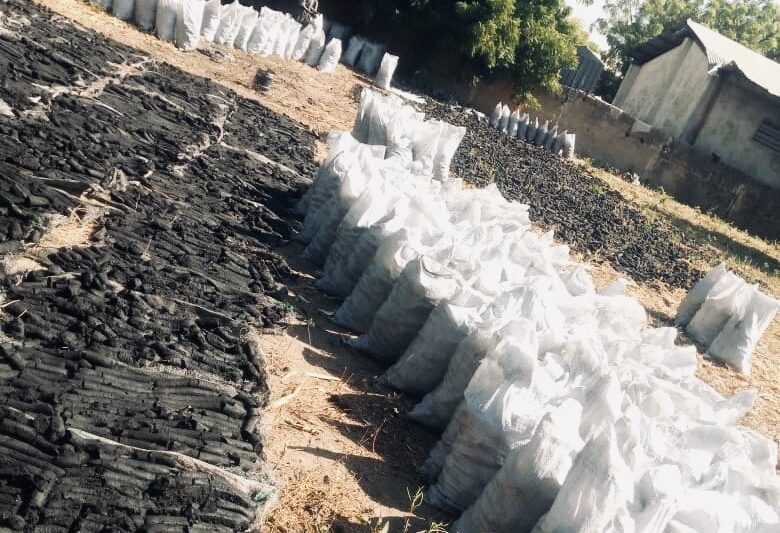Eco-friendly cooking charcoal is not only durable, more efficient and affordable, its production is also providing employment to young people in Maiduguri, Borno State.
A groundbreaking innovation is reshaping the narrative on environmental sustainability and youth empowerment in Maiduguri, the capital of Borno State, in Nigeria’s northeast.
Kariye Green Bio Energy, a local company founded by Ibrahim Ali Amsami, has pioneered a modern method to produce eco-friendly cooking charcoal using agricultural waste and organic materials, such as cassava husks, maize and rice shafts, as well as coconut shells and banana peels.
Amsami says far too many trees are being cut down in Borno State, mostly for firewood, or burnt to make charcoal. So, the 34-year-old decided to do something positive to stop deforestation and environmental harm.
And his innovative approach not only combats deforestation but also provides sustainable livelihoods for local youth, creating a ripple effect of positive change across the region.
Amsami said he sources materials from areas within Borno State, including Zabarmari and Biu.
“It was problematic getting some of the raw materials from Zabarmari – about 25km from Maiduguri – in the rainy season because of flooding but we managed to get the work done.
“I started this initiative a year ago to try to put a stop to the unrelenting felling of trees. Deforestation and desertification are of great concern to environmentalists,” Amsami said.
The process of transforming agricultural waste into eco-friendly cooking charcoal takes several steps.
The waste is collected and left to dry out in the sun. The waste must lose moisture to ensure that it emits less smoke and produces a cleaner burn.
Once dried, the matter is ground – by machine or by hand – and carbonised in a specially prepared earth pit.
The matter is left to cool and then mixed with clay soil, which not only binds it together but also helps to add structure to the final product.
The matter is mixed with water to make a paste that can be shaped – either by hand or in moulds – into briquettes.
Amsami said the briquettes are durable, more efficient and affordable, particularly for less-privileged households in these harsh economic times when most people are finding it hard to afford even the basics.
The product is sold per kilogram, though Amsami said prices might change in the future.
He said he was proud that, beyond combating climate change, the production of eco-friendly cooking charcoal has provided job opportunities. He trained and employed 45 young people, both male and female, which, he said, is helping to contribute to development in the state.
Unemployment is high in Maiduguri, particularly among the youth. Amsami intends to expand in future and hopes to train at least 100 more young people.
Mustapha Gambo, one of the beneficiaries of the initiative, said: “When I was called to start working at Kariye Green Bio Energy, I was surprised by how quickly people began accepting the idea.”
He said he was aware of the dangers of cutting down trees to produce traditional charcoal and praised the initiative for its efforts.
“This modern charcoal does far more than the regular burnt charcoal. Its production is safer and people need to understand its benefits,” he said.
As a young person, Mustapha said he was grateful for the opportunity, which has not only kept him productive but has also enabled him to support his family.
“Initiatives like this help to get young people off the streets and reduce the rate of criminality among youths,” he said.
He called on the government to support similar initiatives for the overall betterment of the state.
Ibrahim Aliyu Izge, a media specialist and activist in Maiduguri, who is involved in creating awareness on climate change and mitigation strategies, said this kind of initiative was of great significance.
“Borno State, located in the Sahel region, is highly prone to desertification. These charcoal briquettes are eco-friendly and they will reduce the need for cutting down so many trees,” Izge said. “Economically, charcoal briquettes are less costly and healthier because of the production process.
“The carbonisation process significantly reduces harmful smoke usually emitted by charcoal,” he said.
Izge emphasised the need to raise awareness about climate change and what was happening to the environment – particularly the long-term effects.
“People need to understand the importance of adopting such methods. It is essential for those familiar with the process to educate larger communities about how it is done and where it can be accessed, creating a safer environment for everyone.”
He pointed out the economic potential of these initiatives.
“If more people take this up as a means of earning a living, a lot of hardship will be alleviated.”
Izge called on the government and humanitarian organisations to step up efforts to combat climate change.
He noted that considerable progress has been made in the past four years to create environmentally friendly spaces.
“Many people, particularly women, are now being taught how to transform waste into wealth, but sustainability remains a challenge,” he said.
He recommended that the government prioritise such initiatives by providing security and access to raw materials to ensure their continuity.
He advised women to adopt micro gardening, a container-based method that allows people to grow vegetables and other plants in small spaces, and urban farming, the practice of cultivating, processing and distributing food in urban areas.
“These practices can go a long way in addressing climate issues and improving livelihoods,” he said.
RUKAIYA AHMED ALIBE







